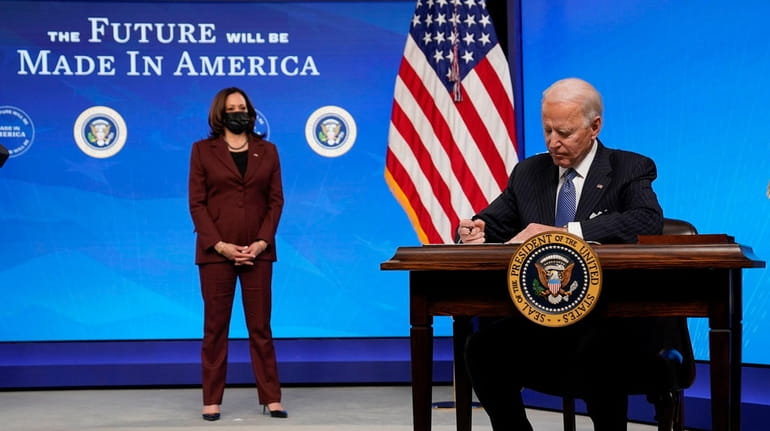U.S. economic approach shows few signs of a hard left turn under Biden

President Joe Biden signs an order closing loopholes in federal purchases from U.S. manufacturers Monday as Vice President Kamala Harris looks on. Credit: AP/Evan Vucci
Even with President Joe Biden's policies still unfolding, right-wing alarms and left-wing hopes about a radical shift in national economic philosophy appear on track to proving overblown.
On Friday, Biden signed executive orders to expand food assistance and send out checks targeted to the lowest-income Americans. Even his GOP predecessor Donald Trump had called the recent coronavirus aid package pushed through by Congress too miserly.
Biden has called for tax cuts for the poor and middle-income earners while proposing to roll back the giant tax cuts for corporations enacted three years ago. What he can accomplish in coming weeks or months without major concessions and compromise, however, will depend on Congress, and those who influence its members.
On Monday, the president signed an executive order meant to boost government purchases of U.S.-made products. The order's potential impact is unclear; The U.S. Chamber of Commerce says 97% of federal procurement funds now go to domestic firms, though they may be using Vietnamese or Mexican factories.
Negotiations with the House and Senate over Biden's $1.9 trillion COVID-19 relief and stimulus package, meanwhile, have yet to show momentum.
Tariff talk from the Biden administration thus far sounds no less nationalistic than Trump's "Buy American" effort, with changes in details but no drastic transformation, The Wall Street Journal reports. In recent years, a bipartisan consensus developed away from "free trade" deals toward federal policies that promote domestic manufacturing.
In his inaugural speech last week, Biden inveighed against racism but sounded no trumpets on wealth inequality in the U.S.
Janet Yellen, who was confirmed as treasury secretary in the Senate on Monday, speaks of reforming tax and trade policies and investing in infrastructure post-pandemic. But she isn't fully committed to restoring federal deductibility of state and local taxes to pre-Trump levels, a major blue-state flashpoint.
Rather, Yellen said cautiously on the subject: "I will work with those at Treasury and throughout the administration in evaluating those impacts, as well as other aspects of this issue," Reuters reported.
Progressives have expressed agitation, meanwhile, at reports that Michael Barr, a law professor and former Obama administration official, has an inside track to become Biden's comptroller of the currency and therefore a key banking regulator.
Advocates to Biden's left want dramatic changes in the policies that office imposes on how banks conduct themselves with regard to equal opportunities, climate change and their ties to tech companies, The New York Times reported.
Biden hasn't supported socializing medicine. He speaks of bolstering and expanding Obamacare. As a senator from Delaware, he was viewed as far from anti-corporate, especially when it came to the DuPont chemical corporation, based in his home state.
In September, Trump declared at a campaign rally: "Socialism is the mainstream of the Biden campaign and it's not the mainstream of America. Remember I said, we will never have a socialist country."
"I beat the socialist," Biden replied then, referring to his last opponent in the primaries, Sen. Bernie Sanders (I-Vt.). "That’s how I got elected. That’s how I got the nomination. Do I look like a socialist? Look at my career — my whole career. I am not a socialist."

